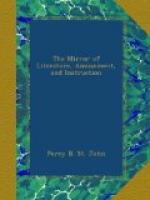Chamberlayne in his Notitia Angliae, says, “Before the conquest, the great council of the king, consisting only of the great men of the kingdom, was called Magnatum Conventus, or else Praelatorum Procerumque Concilium, and by the Saxons in their own tongue Micel Gemote,[3] the great assembly; after the conquest about the beginning of King Edward I., some say in the time of Henry I., it was called by the French word Parlementum, from Parler, to talk together; still consisting (as divers authors affirm) only of the great men of the nation, until the reign of Henry III. when the commons also were called to sit in parliament; for divers authors presume to say, the first writs to be found in records, sent forth to them, bear date 49 Henry III. Yet some antiquaries are of opinion, that long before, nothing of moment wherein the lives or estates of the common people of England were concerned, ever passed without their consent.”
[3] Or Wittenagemote, i.e. assembly of wise men.
In Edward the Third’s time, an act of parliament, made in the reign of William the Conqueror, was pleaded in the case of the Abbey of St. Edmund’s Bury, and judicially allowed by the court. Hence it appears that parliaments or general councils are coeval with the kingdom itself.
Sir Walter Raleigh thinks the Commons were first called on the 17th of Henry I.
Parliamentum de la Blande, was a denomination to a parliament in Edward the Second’s time, whereto the barons came armed against the two Spencers, with coloured bands on their sleeves for distinction.
Parliamentum Insanum, was a parliament held at Oxford, anno 41 Henry III. so called, because the lords came with great retinues of armed men to it; and many things were violently transacted therein against the king’s prerogative.
Parliamentum Indoctorum, was a parliament held at Coventry, 6th Henry VI. whereunto by special precept to the sheriffs of the several counties, no lawyer, or person skilled in the law was to be called.
Parliamentum Diabolicum, was a parliament held at Coventry, 38th Henry VI. wherein Edward, Earl of March (afterwards king) and several others were attainted. The acts passed therein were annulled in the succeeding parliament.
“In 1524, April 15, (says Stowe) a parliament was begun at the Blacke Friers, wherein was demanded a subsidy of L800,000. to be raised of goods and lands, four shillings in every pound; and in the end was granted two shillings. This parliament was adjourned to Westminster, among the blacke monks, and ended in the king’s palace there the 14th of August, at nine of the clocke in the night, and was therefore called the Blacke Parliament.”
Parliaments formerly sat in Westminster Hall and the Chapter house. “In 1397, (says Pennant) when in the reign of Richard II. the hall was extremely ruinous, he built a temporary room for his parliament formed with wood, covered with tiles. It was open on all sides, that the constituents might see every thing that was said and done; and to secure freedom of debate, he surrounded the house with 4,000 Cheshire archers, with bows bent, and arrows knocked ready to shoot. This fully answered the intent, for every sacrifice was made to the royal presence.”




